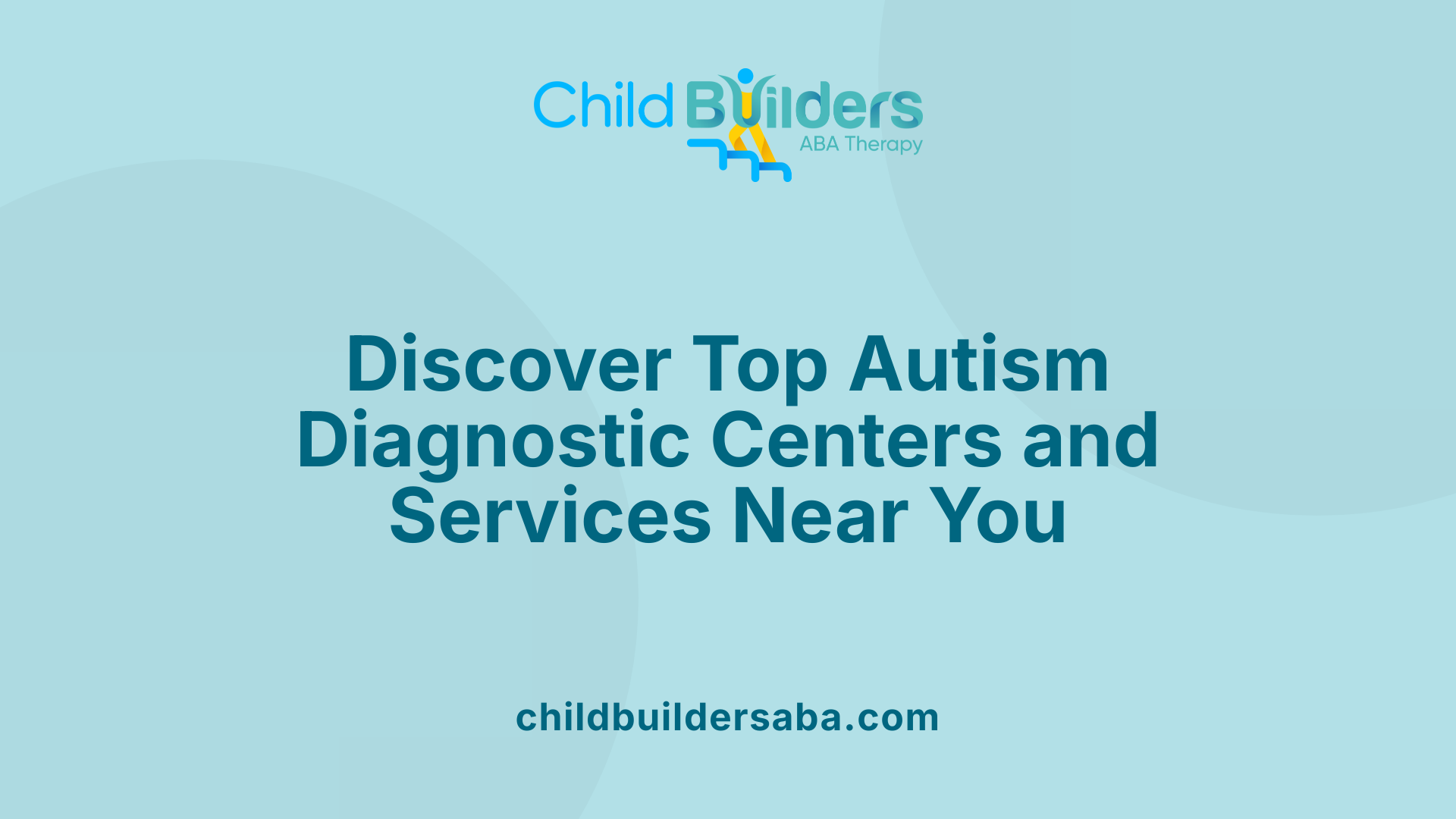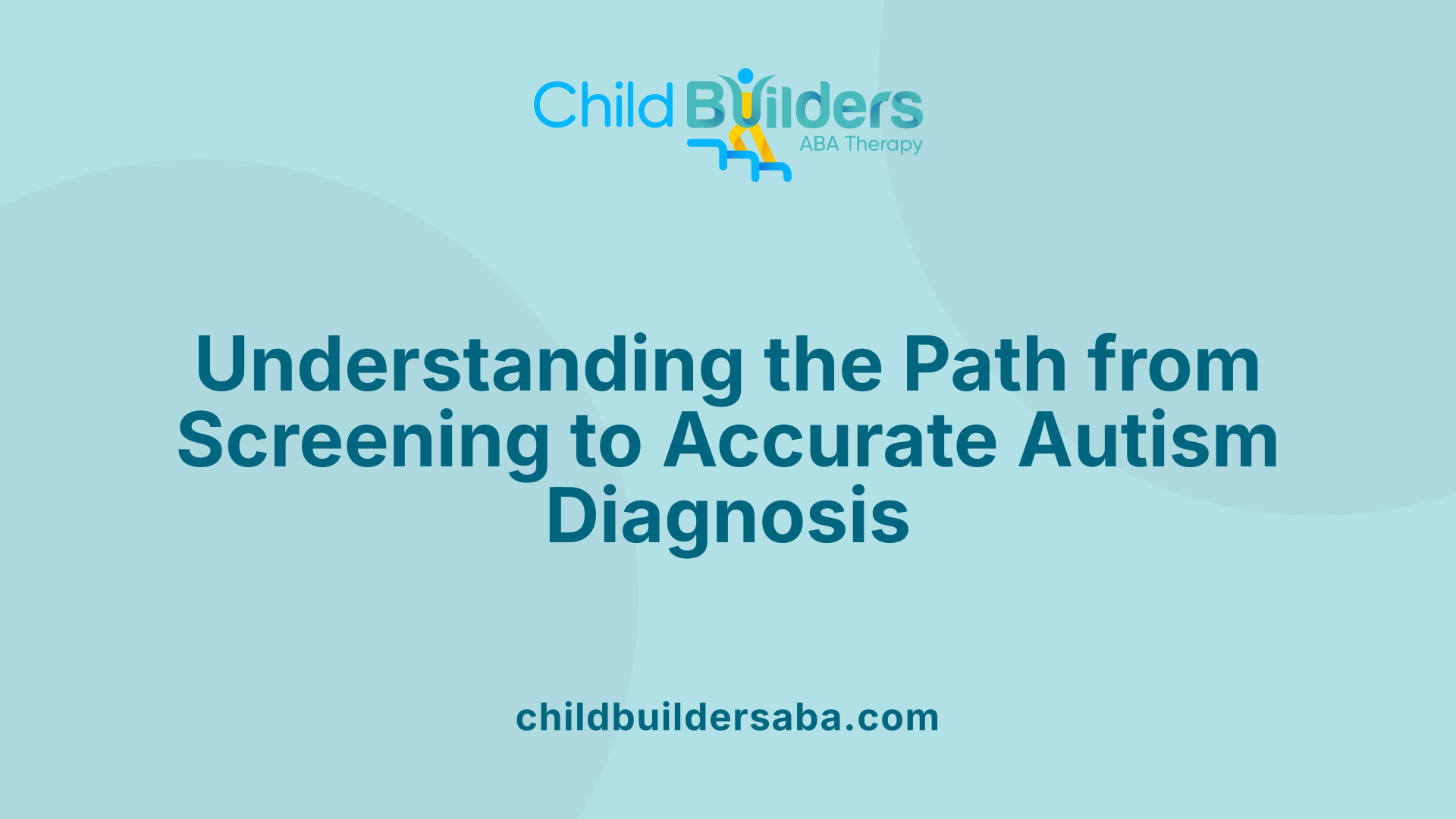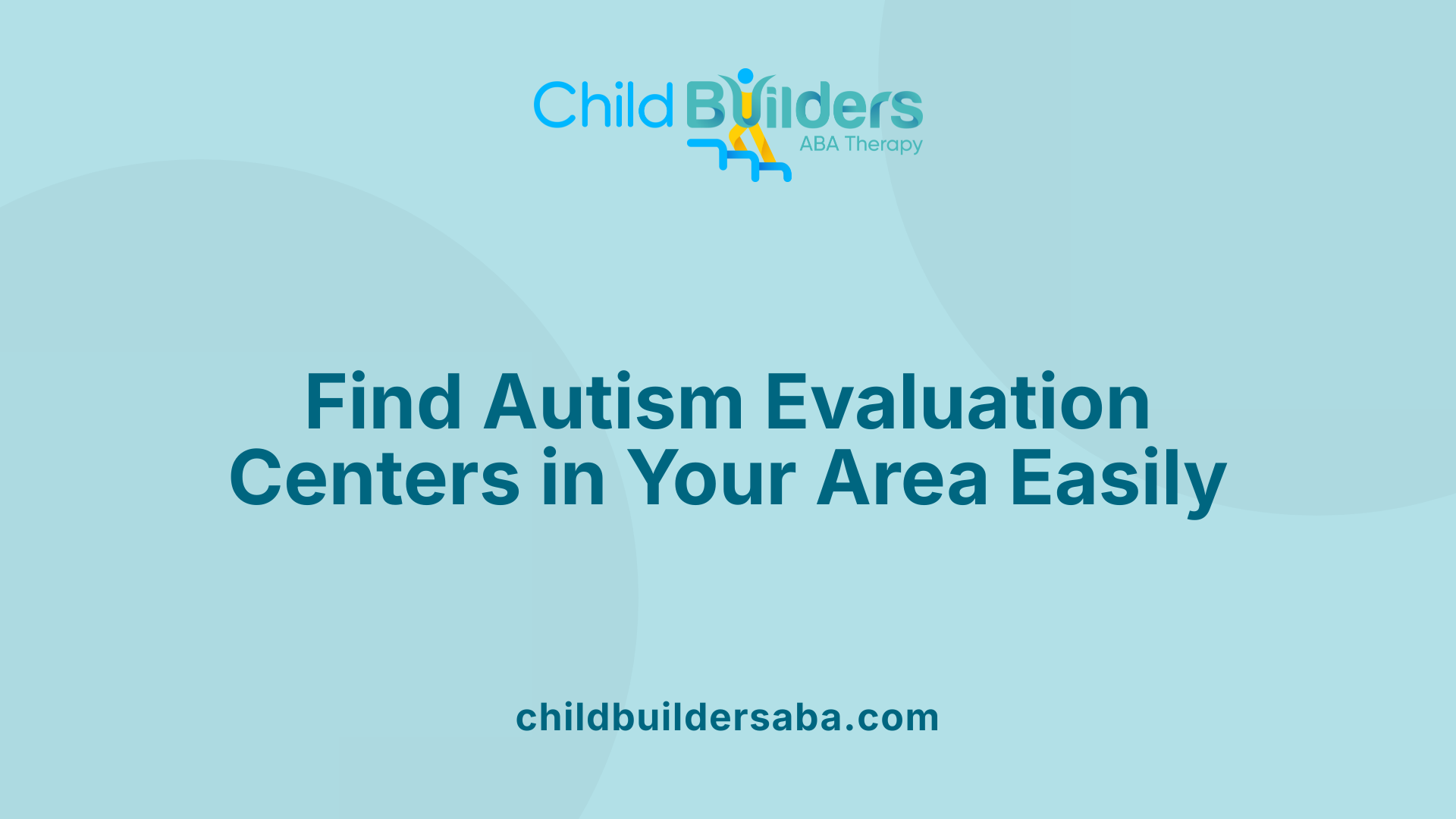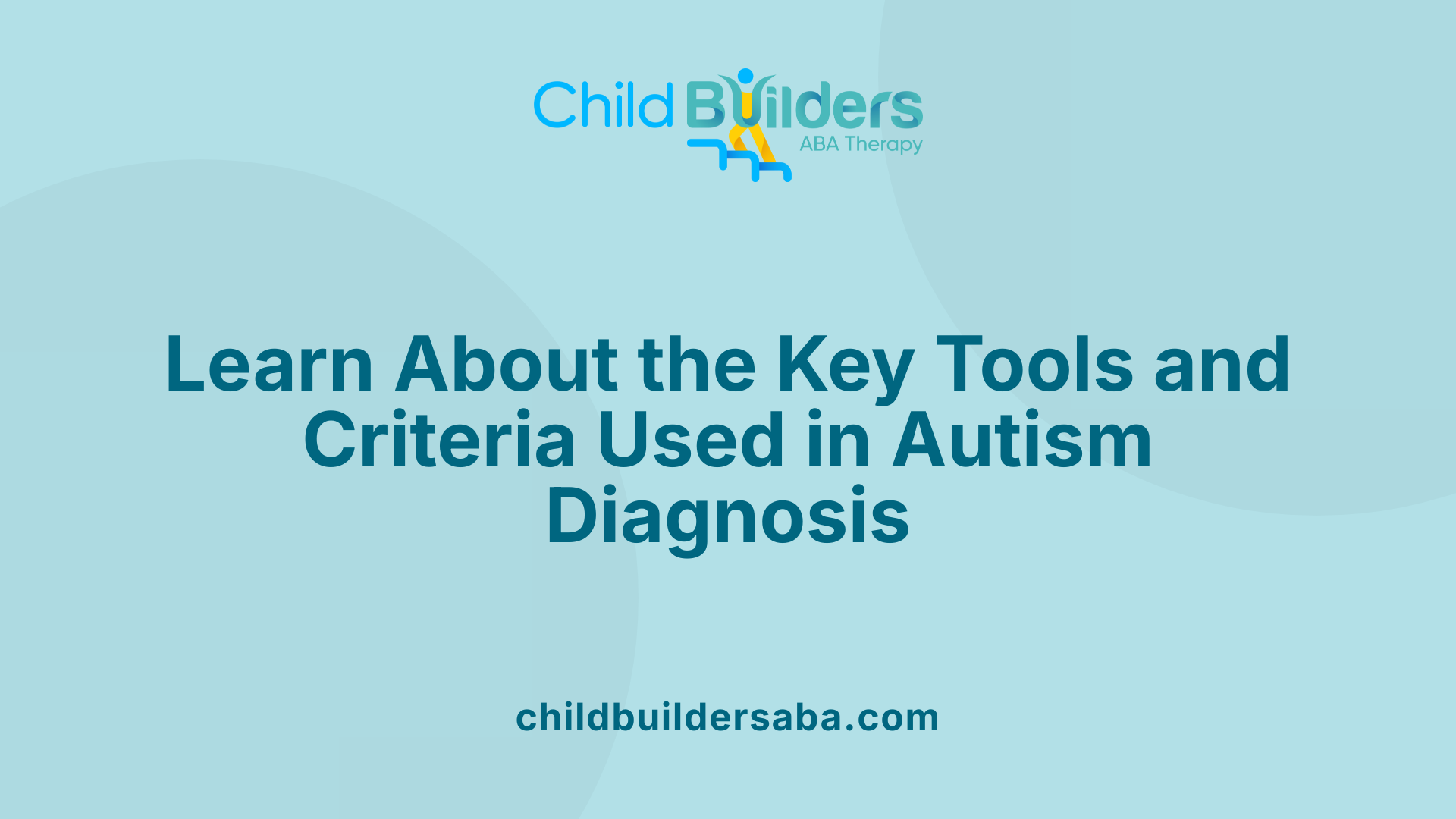Autism Evaluation Centers Near Me

Understanding the Path to Autism Diagnosis and Support
Navigating the journey to diagnose autism can seem complex, but numerous evaluation centers and resources are readily accessible to assist families and caregivers. This article provides an in-depth overview of autism assessment centers, the evaluation process, tools used, and available support strategies to help you make informed decisions for your child's needs.
Comprehensive Autism Diagnostic Centers and Services
 Many centers across the country offer specialized autism diagnostic testing to better understand children’s developmental needs. Locations such as Lighthouse Autism Center, Caravel Autism Health, Child Serve, and Children’s Mercy provide a range of evaluation and treatment options.
Many centers across the country offer specialized autism diagnostic testing to better understand children’s developmental needs. Locations such as Lighthouse Autism Center, Caravel Autism Health, Child Serve, and Children’s Mercy provide a range of evaluation and treatment options.
Lighthouse Autism Center conducts autism assessments at all locations, bringing together licensed professionals including psychologists, social workers, mental health counselors, and Board Certified Behavior Analysts (BCBAs). Their diagnostic process involves a detailed parent interview, an in-person assessment, and the use of standardized tools like the Childhood Autism Rating Scale (CARS 2) and the Autism Diagnostic Observation Schedule (ADOS-2). After the evaluation, licensed psychologists review the findings to discuss diagnoses and next steps.
Similarly, the Center for Disabilities and Development offers comprehensive team evaluations that include not only diagnosis but also treatment recommendations. Their services extend to medication management, behavior assessments, early intervention programs, and evaluations for speech, feeding, sleep disorders, and daily living skills. They emphasize supporting teens through transition to adulthood.
Child Serve in Iowa provides a broad Autism Program that includes evaluations, diagnoses, and treatments for children and young adults. Using multidisciplinary teams, they employ standardized assessments and evidence-based treatments such as Applied Behavior Analysis (ABA). Their specialized Autism Day Program for preschoolers integrates treatments like the STAR curriculum, with a focus on family involvement and parent training. Beyond diagnosis, they also support life skills development and participation in ASD research.
Alongside these centers, Caravel Autism Health offers nationwide evaluation services, using innovative screening tools like the Caravel Early Child Development Screener. Their team of licensed behavioral analysts and clinicians employs data-driven programs to craft personalized treatment plans. They operate clinics across several states, providing accessible diagnostics and treatment.
In addition, various healthcare providers and independent specialists, including pediatricians, neurologists, psychologists, and speech therapists, conduct evaluations. These professionals typically utilize standardized criteria based on the DSM and employ validated assessment tools such as MIGDAS-2 or DIVA 5.
For families searching for autism assessment centers, websites and directories allow quick access to local providers. Common search phrases include “autism evaluation centers,” “autism screening and diagnosis locations,” and “autism assessment centers near me.” These resources facilitate connecting families with licensed professionals capable of diagnosing and supporting individuals on the spectrum.
| Center | Location | Services Offered | Professionals Involved | Assessment Tools |
|---|---|---|---|---|
| Lighthouse Autism Center | Multiple Locations | Evaluation, diagnosis, support services | Psychologists, social workers, counselors, BCBAs | CARS 2, ADOS-2 |
| Center for Disabilities & Development | Iowa | Diagnosis, treatment planning, medication management | Multidisciplinary team | Standardized assessments |
| Child Serve | Iowa | Evaluation, treatment, life skills, transition support | Psychologists, pediatricians, therapists | Various standardized tests |
| Caravel Autism Health | Multiple States | Screening, diagnosis, personalized programs | Behavioral analysts, licensed clinicians | Caravel Screener |
| Children's Mercy | Missouri | Diagnostic services for children | Psychologists, developmental pediatricians | MIGDAS-2, DIVA 5 |
Access to early evaluation and diagnosis makes a significant impact on a child’s future by enabling timely family support, intervention, and access to educational and community resources. Whether through specialized clinics or local healthcare providers, families can find comprehensive services to meet their needs.
The Evaluation Process: From Screening to Diagnosis

What is the typical process for autism diagnosis, screening, and evaluation?
Understanding the path to an autism diagnosis involves several important steps. The process usually begins with developmental monitoring and early screening. During routine checkups, primary care providers use standardized tools like the Modified Checklist for Autism in Toddlers, Revised (M-CHAT-R/F), to identify early signs of autism spectrum disorder (ASD).
If screening results suggest potential concerns, families are encouraged to pursue a comprehensive evaluation. This assessment is conducted by a multidisciplinary team that may include licensed psychologists, behavioral analysts, and other healthcare professionals. The evaluation involves several components:
- Behavioral observations
- In-depth review of developmental history
- Standardized assessments such as the Autism Diagnostic Observation Schedule, Second Edition (ADOS-2) and the Childhood Autism Rating Scale, Second Edition (CARS-2)
These tools help professionals observe behaviors characteristic of ASD and gauge developmental skills. Importantly, diagnosis is based solely on behavioral criteria outlined in the Diagnostic and Statistical Manual of Mental Disorders, Fifth Edition (DSM-5). It is important to note that there are no medical or blood tests that can definitively diagnose autism.
Following the assessment, professionals compile their findings into a detailed report. This report highlights whether diagnostic criteria are met and recommends appropriate interventions, therapies, or supports. Early detection through screening and diagnosis is vital, as it allows access to early intervention programs that can significantly improve outcomes for children.
Overall, the process from screening to diagnosis involves careful observation, standardized testing, historical review, and precise application of behavioral criteria to ensure accurate diagnosis and effective support planning.
Locating Autism Evaluation Centers Close to You
 Availability of centers in different states
Availability of centers in different states
Across the United States, numerous autism evaluation centers are available to families seeking diagnosis and support for children with suspected autism spectrum disorder (ASD). For example, Lighthouse Autism Center operates in multiple locations including Iowa and Cedar Rapids, offering comprehensive assessments conducted by licensed professionals such as clinical psychologists, social workers, and behavior analysts. Caravel Autism Health also maintains clinics in states like Illinois, Wisconsin, Minnesota, Missouri, Iowa, and Washington, providing standardized diagnostic evaluations using evidence-based tools.
In Missouri, Children's Mercy offers a specialized Autism Center with a multidisciplinary team, including psychologists and developmental-behavioral pediatricians, dedicated to thorough diagnosis and early intervention. Michigan has approved autism evaluation centers (AAEC) that meet rigorous criteria, and families can use the Blue Cross Blue Shield provider search tool online to find licensed clinicians such as pediatricians, neurologists, or neuropsychologists specializing in autism assessments.
Collaborations with healthcare providers
Many centers collaborate closely with healthcare providers, including primary care doctors, specialists, and educational institutions. These partnerships facilitate comprehensive evaluation processes and access to early intervention services. For instance, the Centers for Disabilities and Development in Iowa work with various healthcare providers and community resources to offer team assessments and treatment recommendations. Similarly, Children's Mercy coordinates with public school districts to ensure children receive appropriate evaluations and early intervention services.
Services offered at various locations
Services vary depending on the center but generally include diagnostic assessments, behavioral therapy, speech and occupational therapy, and transition support for adolescents. Lighthouse Autism Center conducts evaluations with tools like the ADOS-2 and CARS-2, followed by discussions about diagnoses and next steps. Their teams include licensed psychologists and BCBA professionals, ensuring a thorough, clinical approach.
Child Serve in Iowa offers evaluations, diagnosis, and treatment programs, including outpatient therapy and social groups, across several locations. Their Autism Day Program for young children uses the STAR curriculum and emphasizes family involvement. Many centers also provide early screening with tools like M-CHAT-R to identify concerns as early as toddlerhood, enabling access to early intervention and family support.
| Location | Services Offered | Professional Team | Additional Resources |
|---|---|---|---|
| Lighthouse Autism Center | Autism evaluation, diagnosis, support | Psychologists, social workers, BCBA | Community connections, resource links |
| Caravel Autism Health | Screening, diagnosis, personalized treatment | Licensed behavioral analysts | Nationwide clinics, research participation |
| Children’s Mercy, Missouri | Diagnostic services, early intervention | Psychologists, pediatricians | Family newsletters, training events |
| Centers in Michigan | Comprehensive evaluations, early intervention | Pediatricians, neuropsychologists | State-certified, insurance options |
Finding the right evaluation center involves considering the location, services available, and whether they collaborate with healthcare providers and education systems. Many centers also participate in research and provide educational resources for families. For those seeking options nearby, online searches using terms like "autism centers near me" or "autism evaluation clinics" can help locate appropriate facilities. These evaluations are an essential first step in accessing targeted support and interventions for children on the autism spectrum.
Assessment Tools, Criteria, and Methodologies

What assessment tools, criteria, and methods are used for diagnosing autism?
Diagnosing autism spectrum disorder (ASD) involves a thorough process that combines clinical judgment, behavioral observations, and standardized assessment tools. Since there is no medical test like a blood test for autism, professionals rely on evaluating developmental history and current behavior.
One of the first steps is screening. Tools like the Modified Checklist for Autism in Toddlers, Revised with Follow-Up (M-CHAT-R/F), are used to identify children who may need further assessment. For older children, questionnaires such as the Social Communication Questionnaire (SCQ), and for adolescents and adults, tools like the Autism Spectrum Quotient (AQ) are employed. These screenings are helpful but do not provide a definitive diagnosis.
If screening results suggest the need for a formal evaluation, clinicians use comprehensive diagnostic instruments. Commonly used tools include the Autism Diagnostic Observation Schedule, Second Edition (ADOS-2), and the Childhood Autism Rating Scale, Second Edition (CARS-2). These standardized assessments involve direct interaction and observation by trained professionals, such as licensed psychologists or behavior analysts.
The assessment process aligns with diagnostic criteria from the DSM-5. According to DSM-5, autism is characterized primarily by persistent deficits in social communication and social interaction across multiple contexts, along with restricted, repetitive patterns of behavior, interests, or activities. These symptoms must be evident early in development, cause clinically significant impairment, and cannot be better explained by other conditions.
In addition to behavioral observations, tools like the Developmental, Dimensional, and Diagnostic Interview (3di) and the Diagnostic Interview for Social and Communication Disorders (DISCO) are used to gather comprehensive developmental information.
In summary, diagnosis involves a combination of parent interviews, behavioral assessments, and standardized tools, all interpreted within established diagnostic criteria. This comprehensive approach ensures accurate identification and guides appropriate intervention strategies.
| Assessment Tool | Used For | Age Range | Role |
|---|---|---|---|
| M-CHAT-R/F | Early screening | Toddlers (16-30 months) | Indicates need for further testing |
| CARS-2 | Behavior assessment | Children | Helps assess severity of symptoms |
| ADOS-2 | Observation for diagnosis | Children and adults | Central diagnostic tool |
| SACS-R/SACS-PR | Screening for preschool and primary school children | Preschool and primary school age | Screen for early signs |
| AQ & EQ | Adult screening | Adults | Quantifies traits related to autism |
Using these methods collectively allows clinicians to provide a reliable diagnosis, laying the groundwork for tailored therapies and support.
Professionals Involved in Autism Diagnosis and Assessment
What types of professionals and healthcare providers are involved in autism assessment and diagnosis?
Diagnosing autism spectrum disorder (ASD) requires a collaborative effort among various specialized healthcare providers. Developmental pediatricians and neurologists are often at the forefront, examining developmental history and neurological health. They may conduct physical examinations and order genetic or neurological testing if needed.
Psychologists and neuropsychologists play a pivotal role in the assessment process. They perform detailed evaluations using standardized tools like the Autism Diagnostic Observation Schedule, Second Edition (ADOS-2), and the Childhood Autism Rating Scale, Second Edition (CARS 2). These professionals analyze behavioral, social, and cognitive functioning to identify autism characteristics.
Speech-language therapists and behavior analysts, such as Board Certified Behavior Analysts (BCBAs), are also integral to the diagnosis process. They assess communication skills, feeding issues, and behavior patterns, contributing valuable insights into a child's development.
The team approach ensures a comprehensive evaluation, combining medical, psychological, behavioral, and developmental perspectives. Typically, a collaborative diagnosis involves a licensed psychologist reviewing assessment results, alongside input from other specialists.
While primary care providers may initiate initial screening using tools like M-CHAT-R or SACS, the detailed diagnosis is carried out by licensed experts trained in ASD assessment.
This multidisciplinary collaboration enhances the accuracy of diagnosis and helps in formulating effective, personalized intervention strategies.
| Professional Type | Main Responsibilities | Diagnostic Tools/Methods | Typical Settings |
|---|---|---|---|
| Developmental Pediatrician | Examine developmental history, neurological health | Observation, medical history review | Hospitals, clinics |
| Pediatric Neurologist | Perform neurological assessments | Brain scans, neurological exams | Hospitals |
| Psychologists/Neuropsychologists | Conduct behavioral assessments, IQ testing | ADOS-2, CARS 2, other standardized tests | Assessment centers, clinics |
| Speech-Language Therapists | Evaluate communication and feeding | Speech assessments, language tests | Therapy centers, clinics |
| Behavior Analysts (BCBAs) | Assess behavior, design intervention plans | Functional behavior analysis | Clinical settings, homes |
This integrated approach ensures a well-rounded understanding of each child's unique needs, paving the way for tailored treatments.
Support Strategies, Therapies, and Resources Post-Diagnosis
Children diagnosed with autism spectrum disorder (ASD) have access to a broad range of therapies and support programs tailored to their individual needs. Evidence-based therapies are central to improving communication, social skills, and daily functioning.
One widely used intervention is Applied Behavior Analysis (ABA), which focuses on reinforcing positive behaviors and teaching new skills through data-driven methods. The Early Start Denver Model (ESDM) and Pivotal Response Treatment (PRT) are other effective approaches that emphasize naturalistic teaching strategies to enhance social engagement and communication.
Beyond behavioral therapies, children can benefit from speech, occupational, and social skills training. Speech therapy helps develop language abilities, while occupational therapy focuses on improving daily living skills, sensory integration, and motor coordination. Social skills training programs aim to promote better peer interactions and social understanding.
Community programs and family support resources play a crucial role in comprehensive care. Programs like TEACCH provide structured learning environments that support individual learning styles. Parent training initiatives teach caregivers strategies to support their child's development at home, empowering families with tools and techniques.
Organizations such as Autism Speaks offer grants, informational resources, and community support programs, enabling families to access necessary therapies, assistive devices, and other resources. These supports can significantly improve quality of life and foster independence.
Transition to adulthood is also a vital aspect of post-diagnosis support. Many programs are focused on life skills development, employment training, and independent living strategies for teenagers and young adults with autism. Early planning and continuous support are essential to help individuals with autism navigate this transition successfully.
| Therapy/Support Program | Focus Area | Target Age Group | Additional Details |
|---|---|---|---|
| Applied Behavior Analysis (ABA) | Behavior modification | Children & adults | Data-driven, parent training encouraged |
| Speech Therapy | Communication skills | All ages | Individualized sessions, intervention for language delays |
| Occupational Therapy | Daily living skills | Children | Sensory integration, motor skills |
| Social Skills Training | Peer interactions | Children to teens | Group and individual sessions |
| TEACCH | Structured education | School-aged children | Visual supports, individualized instruction |
| Transition Programs | Life skills | Teens & young adults | Employment prep, independent living |
Choosing the appropriate therapies depends on individual assessment results and family preferences. Collaborating with licensed clinicians and local support organizations ensures tailored, effective intervention planning.
Cost, Insurance, and Financial Assistance for Autism Evaluation
How much does an autism screening and evaluation typically cost?
The expenses for autism evaluations in the United States can vary widely. Typically, the total cost ranges from $1,500 to $5,000. An initial consultation with a licensed psychologist, psychiatrist, or other healthcare professional usually costs between $200 and $500.
Comprehensive assessments, which include behavioral observations and standardized testing such as the Autism Diagnostic Observation Schedule (ADOS-2) or the Childhood Autism Rating Scale (CARS 2), can add an extra $1,000 to $3,000 to the overall cost.
The final expense depends on several factors, including the type of evaluation, provider expertise, and location. For example, specialized clinics like UCLA may charge between $5,000 and $6,000 for thorough diagnostic services. While these costs can seem substantial, insurance coverage often helps reduce out-of-pocket expenses.
Families should check with their insurance providers to understand what portion of the assessment is covered. Many plans offer coverage for diagnostic services, but coverage levels and requirements vary. In cases where insurance falls short, families can look into assistance programs or grants.
Programs such as the United Healthcare Children’s Foundation provide financial aid to families seeking autism evaluations, easing the financial burden. It's advisable for families to research available funding options and inquire directly with clinics and insurance companies to plan accordingly.
Understanding the costs involved and exploring insurance and aid options can make timely and accurate diagnosis more accessible for children and young adults.
Research, Education, and Advocacy Resources
Understanding autism spectrum disorder (ASD) extends beyond diagnosis and treatment; it includes access to educational materials, research participation opportunities, and advocacy efforts aimed at increasing awareness and support.
Numerous resources are available to help families, caregivers, educators, and individuals better understand ASD, its symptoms, and supportive strategies. The Centers for Disease Control and Prevention (CDC) is a primary resource, offering extensive information including recent research findings, early identification tools such as the 'Learn the Signs. Act Early.' program, and the Milestone Tracker app. These tools help parents and professionals recognize developmental signs early and track progress.
The CDC also conducts substantial data collection through initiatives like the Autism and Developmental Disabilities Monitoring (ADDM) Network and the Simons Simplex Collection (SEED) study. This research supports the development of more precise diagnostic criteria and intervention techniques.
Autism Speaks is another vital resource, providing detailed information about autism, ranging from symptoms to intervention options. They also promote community programs designed to foster awareness and advocacy efforts. Their campaigns aim to create inclusive environments and influence policy changes to improve the quality of life for those with autism.
Children’s National Hospital offers a variety of online educational resources, parenting tips, and specialized programs such as summer camps and behavioral support teams tailored for children and their families. These programs not only educate but also enable practical engagement and support.
Organizations like the Autism Society serve as comprehensive sources of educational materials, support networks, and advocacy campaigns. They work tirelessly to promote awareness, acceptance, and policies that enhance services and rights for individuals on the spectrum.
Accessing these resources helps create a broad support system, empowering families and professionals to advocate for better services, participate in research, and implement effective educational strategies for individuals with autism.
Additional Resources to Explore:
| Organization | Primary Focus | Offerings |
|---|---|---|
| CDC | Autism awareness, early signs, research | Developmental tools, data networks |
| Autism Speaks | Public education, advocacy | Support programs, awareness campaigns |
| Children’s National Hospital | Family support, specialized programs | Summer camps, behavioral support resources |
| Autism Society | Education, advocacy, community support | Materials, support networks, campaigns |
Engagement in research and access to educational and advocacy resources play crucial roles in supporting individuals with ASD. The continuous development and dissemination of information promote understanding, acceptance, and access to vital services.
Empowering Families Through Knowledge and Support
Understanding where to find autism evaluation centers near you, the assessment process, available services, and support strategies empowers families and caregivers to advocate effectively for children with autism. By leveraging local resources and engaging with multidisciplinary teams, families can navigate the diagnostic journey confidently and access tailored interventions that promote developmental progress and quality of life.
References
- Center for Autism Waterloo
- Autism | University of Iowa Health Care Stead Family Children's ...
- Autism Program for Kids in Iowa | ChildServe
- Cedar Rapids Autism Center
- Autism screening
- ABA Therapy in Iowa City - Caravel Autism Health
- Find Autism Psychiatrists in Iowa - Psychology Today
- [PDF] Obtaining a comprehensive diagnostic evaluation for autism and ...
- Autism Clinic - Children's Mercy

























.jpg)











































































